
How Can A Criminal Conviction Affect Your Life?
A criminal conviction can affect an individual’s life in several ways. People convicted of crimes may lose their job, have trouble finding another one, and even be barred from certain jobs or professions altogether. A conviction also affects the victim of a crime by making it unlikely that they will ever receive compensation for their injuries, be able to file suit against their attacker, or find employment at all. While these effects are severe, there are many other consequences of conviction that can limit the ability of an individual to enjoy his life and freedom. These limitations include:
1. Being Denied Certain Occupational Opportunities
Many employers routinely run background checks on prospective employees before hiring them. Thus, if you are convicted of a felony, you may not obtain gainful employment with any employer. Some employers refuse to hire anyone who has been convicted of a crime. And should you need to work while incarcerated, prison officials may deny you access to the labor market because of past criminal activity.
2. Having Difficulty Obtaining Housing
The stigma associated with a criminal record makes landlords unlikely to rent property to former criminals. Indeed, many municipalities bar convicted felons from living within city limits altogether. Similarly, banks often refuse to provide mortgages to applicants with histories of criminal behavior. Consequently, a person with a criminal record is more likely than average to face homelessness, unemployment, and economic stress.
3. Limitations On Driver’s License Privileges
Most states restrict the driving privilege of those convicted of serious offenses like murder, rape, armed robbery, burglary, and vehicular manslaughter.
4. Loss Cf Citizenship
Certain acts committed while serving a federal sentence may result in loss of American citizenship. For instance, in 1996, Congress passed the Antiterrorism and Effective Death Penalty Act – the infamous “three strikes” law. Under this law, certain drug traffickers are subject to automatic execution after receiving no fewer than three prior sentences for similar offenses. However, once convicted of the third strike offense, the convict becomes eligible for parole. Therefore it is possible that, despite being sentenced to multiple life terms, an offender whose third strike was for selling drugs could be released after 20 or 30 years.
5. Problems Maintaining Insurance Coverage
It is illegal in California to insure a car used in a hit-and-run accident. Since the only evidence left behind is usually the make of the involved vehicle, insurers consider it virtually impossible to prove that they were actually at fault for the collision. As a consequence of these restrictions, some auto insurance companies routinely exclude all drivers convicted of such crimes from receiving the protection afforded by their policies.
6. Problems Getting Credit
Some banks refuse to issue loans to ex-convicts; others demand extremely high-interest rates for borrowing money. Although financial institutions sometimes fail to give proper consideration to individual circumstances when deciding to whom to lend money, the simple fact remains that most lenders prefer not to extend credit to risk-prone individuals.
It can be argued that a criminal record should not stop you from doing anything if you still want to do it. There are so many ways to get around a criminal record. You don’t need to be unemployed because of your record; visit our criminal defense attorney in Doylestown, PA, for help.
